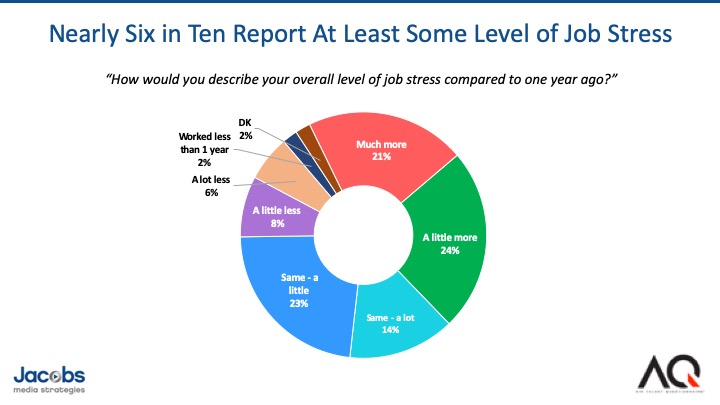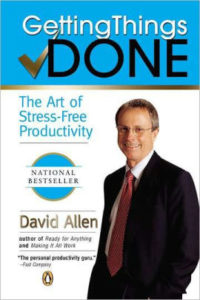Radio DJs are stressed! At Morning Show Boot Camp earlier this month, Fred Jacobs presented the results from our second annual Air Talent Questionnaire, an anonymous survey of more than 1,000 radio DJs. One of the questions we asked was whether DJs feel more job stress now than they did a year ago. Here’s how they responded:

There are many things that can cause job stress, but one that I commonly hear from radio broadcasters is that they have too much to do and not enough time to do it all. It’s no secret that radio professionals are now being asked to do two or three jobs compared to what people were doing two decades ago. Back in 2002, I was an off-air music director at a radio station that also had an off-air program director, an off-air assistant program director, an off-air promotions director, and an off-air assistant promotions director. Situations like that rarely exist today.
 What can broadcasters do to make their jobs less stressful? Several years ago, when my career path detoured away from the radio industry, I found myself working at a leadership development company. While I was there, I learned about David Allen’s “Getting Things Done,” a productivity system that he explains in a book of the same name. I’m not overboard about most so-called “productivity systems.” Lifehacks that involve only checking your email twice a day or starting with the biggest tasks have never really worked for me. But Getting Things Done (or “GTD” as its fans call it) is less of a productivity system and more of a stress reliever. I found that it enabled me to relax more.
What can broadcasters do to make their jobs less stressful? Several years ago, when my career path detoured away from the radio industry, I found myself working at a leadership development company. While I was there, I learned about David Allen’s “Getting Things Done,” a productivity system that he explains in a book of the same name. I’m not overboard about most so-called “productivity systems.” Lifehacks that involve only checking your email twice a day or starting with the biggest tasks have never really worked for me. But Getting Things Done (or “GTD” as its fans call it) is less of a productivity system and more of a stress reliever. I found that it enabled me to relax more.
The reason for this is GTD’s central concept: Don’t try to hold your To Do List in your head because it will drive you crazy. Here’s an example: You shower in the morning and you use up the last of your shampoo, so you tell yourself that you need to buy more on the way home from work. During your staff meeting that morning, you remember that you need to pick up shampoo on your way home; this thought is not useful during your staff meeting. During your airshift that afternoon, the thought once again pops into your head: “Don’t forget the shampoo!” Again, this is not a helpful thought at this particular moment. Then, when you get home from work, you realize that you forget to stop to buy shampoo on the way. For some reason, your brain reminded you to get shampoo constantly throughout the day except when the thought would have been most useful. This is what happens when you try to keep everything on your To Do List in your head — it doesn’t work and it stresses you out.
Under GTD, as soon as you think of something that you need to do, you want to get it out of your head and into a “bucket” where you collect your tasks. That bucket can be whatever works for you — a notepad, your email inbox, a To Do List app like Remember the Milk, or a voice memo app on your phone. It really doesn’t matter as long as you check your bucket regularly and can prioritize and contextualize your list of tasks. But the bottom line is this: When you free your brain from trying to remember everything that you need to do and trust your bucket, your stress level goes down.
Of course, there’s more to GTD than just this. To go deeper, I highly recommend David Allen’s book, or if you prefer, Lifehacker has a good primer on the system.
 While the bucket that you use to collect your tasks under GTD doesn’t need to be a technological solution, there are a number of apps out there that work well with GTD. Remember the Milk is a popular To Do List app that works with GTD. I use an app called ToodleDo; here’s a guide to using it with GTD. Some people prefer the popular app Evernote to execute GTD. At the end of the day, it’s really about what works best for you.
While the bucket that you use to collect your tasks under GTD doesn’t need to be a technological solution, there are a number of apps out there that work well with GTD. Remember the Milk is a popular To Do List app that works with GTD. I use an app called ToodleDo; here’s a guide to using it with GTD. Some people prefer the popular app Evernote to execute GTD. At the end of the day, it’s really about what works best for you.
If you count yourself among those radio broadcasters who are stressed because of the job, look into David Allen’s Getting Things Done. Hopefully, you will find it as useful as I do.
See More Results from the Air Talent Questionnaire
On Wednesday, September 4th, Fred will host a webinar showcasing the results from our survey of on-air talent. If you want to know how your peers feel about the radio industry, please join us.
- A Simple Digital Treat to Thank Your Radio Listeners This Thanksgiving - November 13, 2023
- Interview Questions When Hiring Your Radio Station’s Next Digital Marketing Manager - November 6, 2023
- A Radio Conversation with ChatGPT: Part 2 – Promotions - October 30, 2023





Funnily enough, I actually just wrote down on my to-do list to pick up Shampoo on my way home from work. Thanks for the reminder. 😉 In all seriousness, I am grateful each day for the content coming from Jacobs Media. Thank you for helping me be a better member of our “radio broadcasting family” with your daily dose of thought-provoking content.
Amy, thanks for reading the blog. Much appreciated.
“It’s no secret that radio professionals are now being asked to do two or three jobs compared to what people were doing two decades ago. Back in 2002, I was an off-air music director at a radio station that also had an off-air program director, an off-air assistant program director, an off-air promotions director, and an off-air assistant promotions director. Situations like that rarely exist today.” Additionally, we are all now expected to promote our brands through online and social media platforms, which also takes time and effort.
While I very much appreciate the stress-management processes outlined here, it seems that the underlying problem is that programmers, promotions professionals and DJs are being asked to perpetually do far too much with far too few resources. Until this problem is addressed, we are going to be increasingly stressed. What can be done to alleviate the workload issue?
Until we can address this problem, I’m going to try out your GTD system! Thanks for the continued insightful blogs and useful suggestions.
I definitely hear you, Joan! While this system won’t solve all of the problems, hopefully it can help.